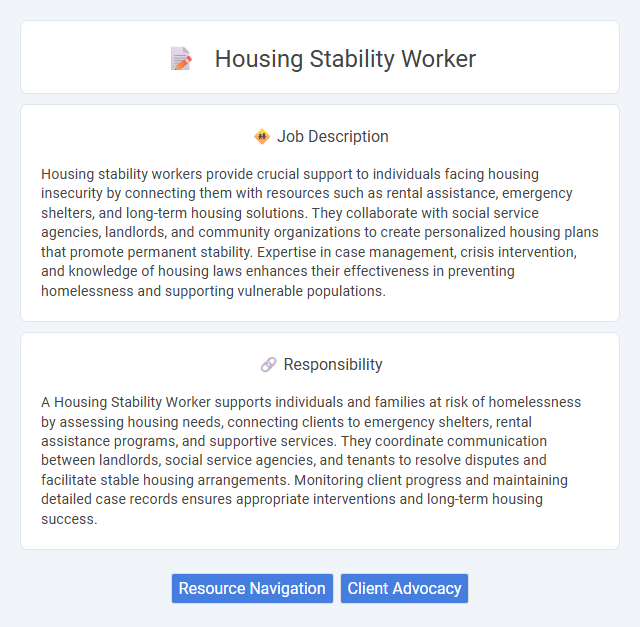
Housing stability workers provide crucial support to individuals facing housing insecurity by connecting them with resources such as rental assistance, emergency shelters, and long-term housing solutions. They collaborate with social service agencies, landlords, and community organizations to create personalized housing plans that promote permanent stability. Expertise in case management, crisis intervention, and knowledge of housing laws enhances their effectiveness in preventing homelessness and supporting vulnerable populations.
Individuals experiencing homelessness or unstable housing conditions may find a Housing Stability Worker role suitable if they possess strong empathy, problem-solving skills, and resilience in high-stress environments. Those who demonstrate patience and effective communication abilities likely have a higher probability of success, as the job often involves navigating complex social services and advocating for clients. Conversely, individuals lacking emotional fortitude or discomfort with bureaucratic processes might struggle with the demands of this position.
Qualification
Housing stability workers require a background in social work, psychology, or human services, often holding a bachelor's degree in these fields. Essential qualifications include strong communication skills, knowledge of housing laws and community resources, and experience in case management or counseling. Certification in crisis intervention and familiarity with local housing assistance programs significantly enhance job performance and employability.
Responsibility
A Housing Stability Worker supports individuals and families at risk of homelessness by assessing housing needs, connecting clients to emergency shelters, rental assistance programs, and supportive services. They coordinate communication between landlords, social service agencies, and tenants to resolve disputes and facilitate stable housing arrangements. Monitoring client progress and maintaining detailed case records ensures appropriate interventions and long-term housing success.
Benefit
Housing stability workers likely provide critical support to individuals and families at risk of homelessness, enhancing their chances of maintaining secure and safe housing. Their guidance and resources probably reduce eviction rates and promote long-term residential stability. Engagement with these workers may also improve access to social services, contributing to overall community well-being.
Challenge
Housing stability workers likely face the challenge of addressing complex client needs within limited resources, which may hinder the effectiveness of their interventions. Navigating bureaucratic systems and securing affordable housing options for vulnerable populations could pose significant obstacles. There is a probability that high caseloads and emotional stress impact their ability to provide consistent support.
Career Advancement
Housing stability workers play a vital role in preventing homelessness by connecting clients to affordable housing resources, support services, and financial assistance programs. Career advancement opportunities often include moving into supervisory roles, case management, or policy development positions within non-profit organizations, government agencies, or social service providers. Specialized certifications in social work or housing management can enhance prospects for higher-level positions and increased responsibilities.
Key Terms
Resource Navigation
A Housing Stability Worker specializes in resource navigation by connecting individuals and families facing housing insecurity with critical services such as emergency shelters, rental assistance programs, and affordable housing options. They assess clients' needs to tailor support plans that include accessing community resources, financial aid, and legal assistance to prevent eviction or homelessness. Proficiency in resource mapping and collaboration with local agencies ensures effective, timely interventions that enhance long-term housing stability.
Client Advocacy
A Housing Stability Worker specializes in client advocacy by ensuring access to essential housing resources, legal support, and social services to prevent homelessness. They collaborate with landlords, government agencies, and community organizations to secure safe and affordable housing options for vulnerable populations. Effective client advocacy involves assessing individual needs, creating tailored housing plans, and empowering clients to maintain long-term residency and stability.
 kuljobs.com
kuljobs.com